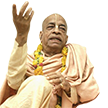Transcendental Position - an essential subject: Difference between revisions
(Created page with "Category:Essential Subjects <!----------------------- edit below this line -----------------------> <!------------------------ begin introduction text below --------------...") |
(Vanibot #0041: Moves Choose Another box to the end) |
||
| Line 2: | Line 2: | ||
<!----------------------- edit below this line -----------------------> | <!----------------------- edit below this line -----------------------> | ||
<!------------------------ begin introduction text below ------------------------> | <!------------------------ begin introduction text below ------------------------> | ||
When one is actually advanced in spiritual knowledge, he is in a transcendental position. In a transcendental position he is called paṇḍita, or a real learned man. And what is that real learned man? How does he visualize this phenomenal world? The Lord says that vidyā-vinaya-sampanne brāhmaṇe gavi hastini: "When one is in the transcendental position, then he sees equally everyone, every living entity." | |||
Srila Prabhupada's books, lectures, conversations and letters offer a comprehensive presentation of this essential subject as seen in the Vaniquotes '''[[Vaniquotes:Category: | One who is positioned transcendentally does not discriminate because he understands that all living entities are in different dresses only. He is concerned only with the Kṛṣṇa consciousness of the living entity. He becomes callous to the activities of this world. As soon as we make our consciousness completely engaged in the service of the supreme consciousness, that is our liberated position. And in that liberated position, whatever we do, there is no reaction. That is the transcendental position. | ||
Srila Prabhupada's books, lectures, conversations and letters offer a comprehensive presentation of this essential subject as seen in the Vaniquotes '''[[Vaniquotes:Category:Transcendental Position|Transcendental Position]]''' category. An introduction from his books is given below in the following 8 quotes. | |||
<!-------- end introduction text and don't touch next three lines ---------> | <!-------- end introduction text and don't touch next three lines ---------> | ||
---- | ---- | ||
== Quotes from Srila Prabhupada's books == | == Quotes from Srila Prabhupada's books == | ||
<!----------------- edit quote boxes below this line -----------------> | <!----------------- edit quote boxes below this line -----------------> | ||
{{VaniQuotebox| | {{VaniQuotebox|In Srimad-Bhagavatam, devotional service is discussed to arouse the living entity to the transcendental position of jnana (knowledge) and vairagya| Because it does not discuss anything material, it is liked by transcendental Vaiṣṇava devotees. The subject matter found in Śrīmad-Bhāgavatam is meant for paramahaṁsas. As it is said, paramo nirmatsarāṇāṁ satāṁ vedyam (SB 1.1.2). A paramahaṁsa is one who does not live in the material world and who does not envy others. In Śrīmad-Bhāgavatam, devotional service is discussed to arouse the living entity to the transcendental position of jñāna (knowledge) and vairāgya (renunciation). '''(Caitanya-caritāmṛta, Madhya-līlā 19.17)'''}} | ||
{{VaniQuotebox|In the present age the vibration of the Hare Krsna maha-mantra is the only process that is in a transcendental position, beyond material contamination|The spiritual world is called Vaikuṇṭha, which means "without anxiety." In the material world everything is full of anxiety (kuṇṭha), whereas in the spiritual world (Vaikuṇṭha) everything is free from anxiety. Therefore those who are afflicted by a combination of anxieties cannot understand the Hare Kṛṣṇa mantra, which is free from all anxiety. In the present age the vibration of the Hare Kṛṣṇa mahā-mantra is the only process that is in a transcendental position, beyond material contamination. '''(Caitanya-caritāmṛta, Ādi-līlā 7.74)'''}} | |||
{{VaniQuotebox| | {{VaniQuotebox|Material advancement in religion, economic development, sense gratification and liberation simply wait to serve a devotee at the first opportunity. A devotee is already in a transcendental position; he does not need further qualifications to be liberated| Material advancement in religion, economic development, sense gratification and liberation simply wait to serve a devotee at the first opportunity. A devotee is already in a transcendental position; he does not need further qualifications to be liberated. As confirmed in Bhagavad-gītā (14.26), sa guṇān samatītyaitān brahma-bhūyāya kalpate: a devotee is transcendental to the actions and reactions of the three modes of material nature because he is situated on the Brahman platform. '''(Śrīmad-Bhāgavatam 7.6.25)'''}} | ||
{{VaniQuotebox| | {{VaniQuotebox|Merging into the impersonal effulgence of the Lord is called param padam, but there is a higher transcendental position, which is the association of the Supreme Personality of Godhead|Merging into the impersonal effulgence of the Lord is called paraṁ padam, but there is a higher transcendental position, which is the association of the Supreme Personality of Godhead. Brahmeti paramātmeti bhagavān iti śabdyate (SB 1.2.11). The Absolute Truth is realized first as impersonal Brahman, then as Paramātmā, and finally as Bhagavān. Thus the Personality of Godhead, Bhagavān, is parataḥ parāt, beyond Brahman and Paramātmā realization. '''(Śrīmad-Bhāgavatam 4.30.31)'''}} | ||
{{VaniQuotebox| | {{VaniQuotebox|One may come to the right conclusion regarding the Lord's transcendental position. One who can come to the conclusion of the Lord's transcendence can become a devotee of the Lord|One should always discriminate between the activities of the Lord and those of ordinary living beings. Thus one may come to the right conclusion regarding the Lord's transcendental position. One who can come to the conclusion of the Lord's transcendence can become a devotee of the Lord and can at once be free from all reactions of past deeds. It is said, karmāṇi nirdahati kintu ca bhakti-bhājām: the Lord minimizes or nullifies the reactionary influence of the devotee's past deeds. (Bs. 5.54) '''(Śrīmad-Bhāgavatam 3.1.44)'''}} | ||
{{VaniQuotebox| | {{VaniQuotebox|One should be situated in the transcendental position, beyond the stages of material consciousness, and should be aloof from all other conceptions of life. Thus realizing freedom from false ego, one should see his own self|One should be situated in the transcendental position, beyond the stages of material consciousness, and should be aloof from all other conceptions of life. Thus realizing freedom from false ego, one should see his own self just as he sees the sun in the sky. | ||
Consciousness acts in three stages under the material conception of life. When we are awake, consciousness acts in a particular way, when we are asleep it acts in a different way, and when we are in deep sleep, consciousness acts in still another way. '''(Śrīmad-Bhāgavatam 3.27.10)'''}} | |||
{{VaniQuotebox| | {{VaniQuotebox|The best path is to transcend all material curses and benedictions and take shelter of the Supreme Lord, Krsna, and remain in a transcendental position|The best path is to transcend all material curses and benedictions and take shelter of the Supreme Lord, Kṛṣṇa, and remain in a transcendental position. Persons who have taken shelter of Kṛṣṇa are always peaceful; they are never cursed by anyone, nor do they attempt to curse anyone. That is a transcendental position. '''(Śrīmad-Bhāgavatam 4.2.27)'''}} | ||
{{VaniQuotebox| | {{VaniQuotebox|The conception of God as some ruling power or as the impersonal Brahman can be reached by persons who are in the inferior energy of the Lord, but the Personality of Godhead cannot be conceived unless one is in the transcendental position| We can actually understand Kṛṣṇa, who is eternal, full of bliss and knowledge, simply by studying His words in Bhagavad-gītā and Śrīmad-Bhāgavatam. The conception of God as some ruling power or as the impersonal Brahman can be reached by persons who are in the inferior energy of the Lord, but the Personality of Godhead cannot be conceived unless one is in the transcendental position. '''(Bhagavad-gītā 10.2)'''}} | ||
<!----------------- edit quote boxes above this line -----------------> | <!----------------- edit quote boxes above this line -----------------> | ||
''' | '''Transcendental Position - [[Vaniquotes:Category:Transcendental Position|explore more within this category]]'''. | ||
{{EsentialSubjectTotal}} | {{EsentialSubjectTotal}} | ||
<div style="float:left;"> | |||
{{EssentialSubjectnav}} | |||
</div> | |||
__NOTOC__ | __NOTOC__ | ||
__NOEDITSECTION__ | __NOEDITSECTION__ | ||
Latest revision as of 17:58, 22 November 2020
When one is actually advanced in spiritual knowledge, he is in a transcendental position. In a transcendental position he is called paṇḍita, or a real learned man. And what is that real learned man? How does he visualize this phenomenal world? The Lord says that vidyā-vinaya-sampanne brāhmaṇe gavi hastini: "When one is in the transcendental position, then he sees equally everyone, every living entity."
One who is positioned transcendentally does not discriminate because he understands that all living entities are in different dresses only. He is concerned only with the Kṛṣṇa consciousness of the living entity. He becomes callous to the activities of this world. As soon as we make our consciousness completely engaged in the service of the supreme consciousness, that is our liberated position. And in that liberated position, whatever we do, there is no reaction. That is the transcendental position.
Srila Prabhupada's books, lectures, conversations and letters offer a comprehensive presentation of this essential subject as seen in the Vaniquotes Transcendental Position category. An introduction from his books is given below in the following 8 quotes.
Quotes from Srila Prabhupada's books
Transcendental Position - explore more within this category.
Vanipedia has now over 903 introductory articles compiled from Srila Prabhupada's books under the series titled Essential Subjects. All these articles can be seen in the Table of Content on the right side of this article and also here in this Umbrella Category. Browse through them to relish the breadth and depth of Srila Prabhupada's teachings - There is a subject for everyone.







